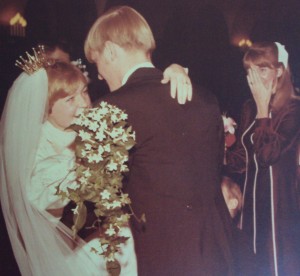Tears and crying are part and parcel of most wakes and funerals. That’s logical. But I’m learning that the funerals of people who have lived their lives well include hearty laughter and many smiles, too.
Today John Welch had such a funeral. Although his grandchildren, most in their twenties, had difficulty talking about their grandpa without crying, they also found themselves joking through their tears. Grandpa’s death caused sadness only because he was such a powerful presence in their lives, which was a good reason to smile.
The pastor turned to these “kids”, nearly twenty of them, and said, “I hope you realize how fortunate you all are, to have had a grandfather like yours, a man who prayed for you every day and told you he loved you every time he talked with you.” When the magnitude of blessing is that great, a funeral brings joy to its mourners along with their tears.
Those of us who attend such a funeral as secondary mourners, i. e. not part of the deceased’s family, find ourselves taking our cue from the primary mourners. We gain courage from their smiles and enjoy conversation with them and other dear friends we’ve not seen in years. Funerals are important events, and caring people gain courage from grieving together.
Something else positive happens at the funeral of a person who finished strong. We in the audience leave the event with a fresh resolve to live better ourselves, because the one being celebrated did so well. John Welch’s relatives described this man as one who prayed volumes, found good in everyone and steadily grew in his faith. After hearing this, I want to do the same.
Several speakers mentioned John’s attitude of humble servanthood and his gift of helps saying, “No job was beneath him.” As I listened, I asked myself if that was true of me. Was I willing to step into any set of circumstances where there was need? All I could see was massive room for improvement.
Joy and sorrow are closely linked. The old expression, “I might as well laugh or I’ll cry,” has a world of truth in it. Although John Welch had reasons to cry during his life such as having to bury both of his beloved wives, he practiced his hearty laugh on a daily basis and encouraged others to focus on the good in their lives.
He consistently testified that the only reliable source of true joy was his relationship with Christ. And because of this, he could laugh with gusto at his own troubles, and we could smile throughout his funeral.
“Even in laughter the heart may ache.” (Proverbs 14:13a)




